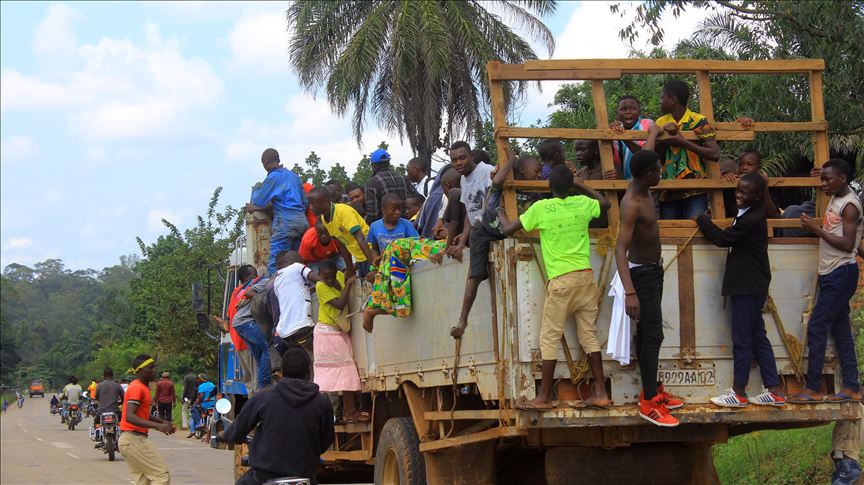Shutdown in Uganda over COVID-19 hits poor hard
Times tough not only due to fears of infection but also because of poverty, says shop owner
 file photo
file photo
KAMPALA, Uganda
Uganda’s poor are bearing the brunt of a nationwide shutdown declared by President Yoweri Museveni as part of efforts to contain the novel coronavirus outbreak.
Museveni ordered restrictions on movement of people, including use of public or private vehicles, motorcycles, and directed closure of all shopping malls, arcades, hardware shops, all non-food stores, saloons, lodges and garages for 14 days, to roll back the spread of COVID-19.
The move came after Uganda reported its first confirmed case of the COVID-19 on March 22. One week later, the number surpassed 30, with no recorded deaths or recoveries.
The immediate impact of the shutdown is on the survival of the country’s hardest-hit citizens whose livelihoods depend on what the president shut down to put food on their tables.
“The management of Nsereko Suitcases has made a difficult decision to close our shops until further notice,” said a notice on a shop in uptown Kampala. The shop owner Swaib Nsereko said people were no longer coming to his shop.
“In the prevailing circumstances, there is no one thinking about buying a suitcase at this time, people are saving their money for emergencies, like food and medicine. These are hard times for us, not only because of the fear of contracting the highly infectious disease, but also due to poverty. This business has been on the verge of collapse, by the time coronavirus threat recedes, I am not sure it will make it back to life,” Swaib Nsereko told Anadolu Agency.
In reality, majority of the people in Uganda depend on what the president shut-down, to put food on their tables.
Economic impact
Fazhil Mwesigwa, an economist and the Director of Risk Management at the Arab Bank for Economic Development in Africa told Anadolu Agency that more decisive measures to halt the transmission of COVID-19 are imperative due to the pandemic’s fast and deep damaging impacts on people and the economy.
“The lockdowns we are seeing in various countries and cities will certainly bring about an economic slowdown, as tax collection targets won’t be met amidst high government spending, which will affect national income targets and service delivery. In addition, as the labour force is locked down, both production and personal incomes will suffer, slowing down supply and demand in the markets, and this is a perfect recipe for a recession.
“For some hard-hit sectors such as tourism and transportation, the lockdowns might eventually result in closure of some businesses. While counterintuitively the last few weeks have seen rapid increase in spending on some essential goods as the panicked public stocks supplies, this boost is only short-lived. Eventually, the longer the shutdown lasts, the worse its impacts will be.
“In time, it is possible to bring the economy back to life, but it is impossible to bring the dead back to life. Normalcy will return when the ravaging virus is contained. Shut-down measures, already in place in some parts of the world, are easily implemented in high-income countries, where majority of the citizens have savings and social safety nets.
“This is one area where governments of less developed countries need to openly engage with all stakeholders and find a tailored solution that will sustain minimum standards of living for people during the lockdown period. The burden better be shared,” Fazhil said.
Hassan Abigira, a private taxi driver, decided to send his family of four to his village in the countryside, 300 kilometers (186.4 miles) from Uganda’s capital Kampala, due to anxiety and uncertainty.
“People are opting to stay home and the demand for taxi services has sharply declined. You would assume that after banning public transportation, people would opt for our private taxi services, but they are not. In the last three days, I have not got a client, life is becoming unbearably hard. This is a rented car, I have to service its loan every week, I don’t understand what’s going on,” he said.
Sewagude Sulait, a shop attendant in a Kampala suburb, said that even before the first case was confirmed in Uganda, the effects of COVID-19 were already taking toll due to global interconnectedness. When countries started declaring lock-downs, prices of commodities started souring. All items have increased in price,” he said.
Asked why those items that are locally produced with no extra cost also had increased prices, he said the current supply is not enough to fulfill the demands fueled by panic buying. “As we all know, the simple logic of a free economy is, higher demand leads to higher cost” he said.
The Ugandan president warned all traders against exploiting the situation by raising the price of goods due to the spread of COVID-19 infection. Uganda has no Price Control and Anti-Profiteering laws.
Spread of COVID-19
After first appearing in Wuhan, China, in December, the virus known as COVID-19 has spread to at least 178 countries and regions. The World Health Organization declared the outbreak a pandemic.
According to data compiled by U.S.-based Johns Hopkins University, the confirmed number of cases worldwide has surpassed 801,400, with the death toll over 38,700, and more than 172,600 recoveries.
Despite the severity of the virus, most people experience mild symptoms and recover.








